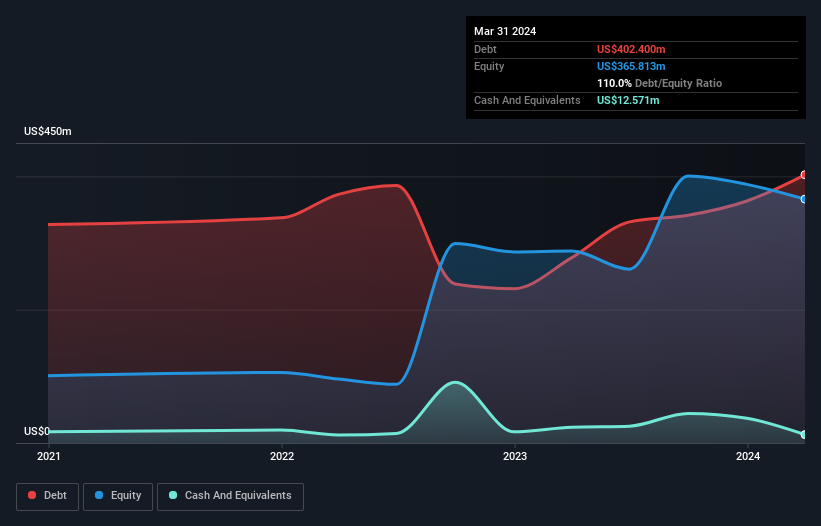
Some say volatility, rather than debt, is the best way to think about risk as an investor, but Warren Buffett famously said that 'Volatility is far from synonymous with risk.' It's only natural to consider a company's balance sheet when you examine how risky it is, since debt is often involved when a business collapses. We note that Westrock Coffee Company (NASDAQ:WEST) does have debt on its balance sheet. But is this debt a concern to shareholders?
What Risk Does Debt Bring?
Generally speaking, debt only becomes a real problem when a company can't easily pay it off, either by raising capital or with its own cash flow. Ultimately, if the company can't fulfill its legal obligations to repay debt, shareholders could walk away with nothing. However, a more usual (but still expensive) situation is where a company must dilute shareholders at a cheap share price simply to get debt under control. Of course, plenty of companies use debt to fund growth, without any negative consequences. The first thing to do when considering how much debt a business uses is to look at its cash and debt together.
Check out our latest analysis for Westrock Coffee
What Is Westrock Coffee's Net Debt?
You can click the graphic below for the historical numbers, but it shows that as of March 2024 Westrock Coffee had US$402.4m of debt, an increase on US$277.6m, over one year. However, because it has a cash reserve of US$12.6m, its net debt is less, at about US$389.8m.

How Strong Is Westrock Coffee's Balance Sheet?
The latest balance sheet data shows that Westrock Coffee had liabilities of US$220.3m due within a year, and liabilities of US$397.2m falling due after that. On the other hand, it had cash of US$12.6m and US$90.2m worth of receivables due within a year. So its liabilities outweigh the sum of its cash and (near-term) receivables by US$514.7m.
This is a mountain of leverage relative to its market capitalization of US$855.0m. This suggests shareholders would be heavily diluted if the company needed to shore up its balance sheet in a hurry. The balance sheet is clearly the area to focus on when you are analysing debt. But it is future earnings, more than anything, that will determine Westrock Coffee's ability to maintain a healthy balance sheet going forward. So if you want to see what the professionals think, you might find this free report on analyst profit forecasts to be interesting.
In the last year Westrock Coffee had a loss before interest and tax, and actually shrunk its revenue by 4.0%, to US$852m. That's not what we would hope to see.
Caveat Emptor
Over the last twelve months Westrock Coffee produced an earnings before interest and tax (EBIT) loss. To be specific the EBIT loss came in at US$12m. Considering that alongside the liabilities mentioned above does not give us much confidence that company should be using so much debt. So we think its balance sheet is a little strained, though not beyond repair. However, it doesn't help that it burned through US$245m of cash over the last year. So suffice it to say we consider the stock very risky. When analysing debt levels, the balance sheet is the obvious place to start. However, not all investment risk resides within the balance sheet - far from it. Be aware that Westrock Coffee is showing 3 warning signs in our investment analysis , you should know about...
If you're interested in investing in businesses that can grow profits without the burden of debt, then check out this free list of growing businesses that have net cash on the balance sheet.
Valuation is complex, but we're here to simplify it.
Discover if Westrock Coffee might be undervalued or overvalued with our detailed analysis, featuring fair value estimates, potential risks, dividends, insider trades, and its financial condition.
Access Free AnalysisHave feedback on this article? Concerned about the content? Get in touch with us directly. Alternatively, email editorial-team (at) simplywallst.com.
This article by Simply Wall St is general in nature. We provide commentary based on historical data and analyst forecasts only using an unbiased methodology and our articles are not intended to be financial advice. It does not constitute a recommendation to buy or sell any stock, and does not take account of your objectives, or your financial situation. We aim to bring you long-term focused analysis driven by fundamental data. Note that our analysis may not factor in the latest price-sensitive company announcements or qualitative material. Simply Wall St has no position in any stocks mentioned.
Have feedback on this article? Concerned about the content? Get in touch with us directly. Alternatively, email editorial-team@simplywallst.com
About NasdaqGM:WEST
Westrock Coffee
Westrock Coffee Company, LLC operates as an integrated coffee, tea, flavors, extracts, and ingredients solutions provider in the United States and internationally.
Undervalued with reasonable growth potential.
Similar Companies
Market Insights
Community Narratives



